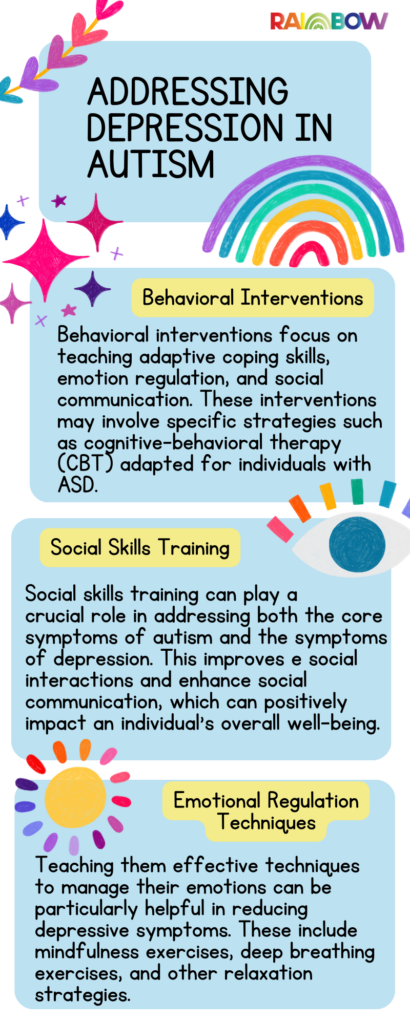The relationship between autism and depression has been a topic of significant interest and research. Understanding this link is crucial for parents, caregivers, and teachers of individuals with autism. In this section, we will explore the prevalence of depression in autism and the factors that contribute to this connection.

Prevalence of Depression in Autism
Research indicates that individuals with autism are at a higher risk for developing depression compared to the general population. Studies have shown that about 40% of individuals with autism also experience symptoms of depression. This higher prevalence underscores the importance of addressing mental health concerns in individuals with autism.
Factors Contributing to the Connection
The connection between autism and depression is complex and is likely influenced by a combination of genetic, neurobiological, and environmental factors. While the exact mechanisms are still being investigated, several hypotheses have been proposed to explain this relationship.
One possible contributing factor is the presence of overlapping genetic vulnerabilities. Research suggests that certain genes may play a role in both autism and depression, contributing to shared risk factors. Additionally, neurobiological differences in brain structure and functioning may contribute to the increased susceptibility of individuals with autism to depression.
Environmental factors, such as the social and sensory challenges faced by individuals with autism, can also contribute to the development of depression. The presence of autism traits, including difficulties with social interactions, communication, and behavioral flexibility, can create additional stressors that may contribute to the onset of depressive symptoms.
It is important to note that depression may present differently in individuals with autism compared to those without autism. Depression in individuals with autism may manifest as irritability, aggression, anxiety, and withdrawal, rather than the typical symptoms seen in the general population. These atypical presentations can make it challenging to diagnose depression in individuals with autism, highlighting the need for careful assessment and evaluation by professionals knowledgeable about both autism and mental health disorders.
By understanding the link between autism and depression, we can better support individuals on the autism spectrum and provide appropriate interventions and treatments. Early recognition and treatment of depression in individuals with autism is crucial for improving their quality of life and overall functioning. In the following sections, we will explore the unique manifestations of depression in autism, the co-occurrence of autism, depression, and anxiety, and the treatment approaches for depression in individuals with autism.

Unique Manifestations of Depression in Autism
Depression can manifest differently in individuals with autism compared to neurotypical individuals. The challenges in diagnosing depression in autism and the impact it has on social interactions and behavior are important aspects to consider.
Challenges in Diagnosing Depression
Diagnosing depression in individuals with autism can be challenging due to several factors. Traditional diagnostic criteria for depression may not fully capture the unique manifestations of depression in individuals on the autism spectrum. Autistic individuals may struggle to communicate their emotions verbally, making it difficult for clinicians to assess their emotional well-being accurately.
Moreover, the symptoms of depression in autism often present in a different manner. Instead of expressing sadness, individuals with autism may demonstrate irritability, aggression, anxiety, and withdrawal. These atypical symptoms can be mistaken for core features of autism rather than indicators of depression. As a result, depression in individuals with autism may go undiagnosed or be misattributed to other factors. This underscores the importance of professionals who are knowledgeable about both autism and depression when conducting assessments.

Impact on Social Interactions and Behavior
Depression in individuals with autism can significantly impact their social interactions and behavior. The presence of depression can exacerbate existing challenges related to social interactions, communication, and behavioral flexibility. Individuals with autism and depression may experience heightened social withdrawal, difficulty engaging in social activities, and reduced interest in previously enjoyed activities.
Depression can also contribute to increased irritability and aggression in individuals with autism. These behavioral changes can be distressing for both the individual and their caregivers, further impacting their quality of life. Identifying and addressing depression in individuals with autism is crucial not only for the individual’s emotional well-being but also for their overall functioning and social development.
Understanding the unique manifestations of depression in autism is vital for accurate diagnosis and appropriate intervention. By recognizing the atypical symptoms of depression and their impact on social interactions and behavior, professionals, parents, caregivers, and teachers can provide the necessary support and seek appropriate treatment for individuals with autism and depression.
Importance of Early Recognition and Treatment
Recognizing and addressing depression in individuals with autism is of utmost importance in order to improve their quality of life and overall functioning. Early recognition and intervention can make a significant difference in the well-being of individuals with autism.
Improving Quality of Life and Functioning
Depression can have a profound impact on the emotional well-being of individuals with autism. It can exacerbate existing challenges related to social interactions, communication, and behavioral flexibility. It is crucial to identify and address depression in individuals with autism to improve their quality of life and functioning.
When depression goes unrecognized and untreated, it can lead to a range of negative consequences. It can further isolate individuals with autism and impair their ability to engage in meaningful relationships and activities. Depression can also hinder their progress in therapy and educational settings, affecting their overall development and learning outcomes.
By recognizing the signs and symptoms of depression early on, parents, caregivers, and teachers can seek appropriate support and interventions. This may include therapy, counseling, or other evidence-based treatments tailored to the unique needs of individuals with autism.
In addition to professional support, creating a supportive and inclusive environment is crucial for individuals with autism who are experiencing depression. Providing social support, fostering a sense of belonging, and promoting emotional well-being can contribute to improved outcomes.

Co-Occurrence of Autism, Depression, and Anxiety
The relationship between autism, depression, and anxiety is complex and often intertwined. Individuals with autism are at a higher risk for developing depression compared to the general population. Similarly, anxiety often co-occurs with depression in individuals with autism, with studies suggesting that 40-50% of people with autism also face symptoms of anxiety.
The Relationship between Autism, Depression, and Anxiety
Depression can present differently in individuals with autism, often manifesting as irritability, aggression, anxiety, and withdrawal. This can make it challenging to diagnose and differentiate from core autism symptoms. In fact, the prevalence of a lifetime depression diagnosis among autistic adults can be as high as 37%. People with more autistic traits tend to show significantly more depression symptoms than those with fewer autistic traits.
Anxiety commonly co-occurs with both autism and depression. The presence of anxiety symptoms can exacerbate depressive symptoms and vice versa, leading to a greater overall impact on an individual’s well-being. It is crucial to recognize and address both depression and anxiety in individuals with autism to provide comprehensive support and treatment.

Addressing Multiple Mental Health Conditions
When managing autism, depression, and anxiety, it is important to adopt a holistic approach that considers the unique needs of the individual. Treatment plans should be tailored to address the specific challenges posed by autism, depression, and anxiety simultaneously. This may involve a combination of therapy, medication, and other interventions.
Therapy options such as cognitive-behavioral therapy (CBT) can be effective in treating both depression and anxiety in individuals with autism. CBT helps individuals identify and modify negative thought patterns, develop coping strategies, and improve emotional regulation skills.
Medication may also be prescribed in some cases to alleviate symptoms of depression and anxiety. However, it is essential to work closely with a healthcare professional to determine the most appropriate medication and dosage for each individual, taking into account any potential interactions or side effects.
In addition to therapy and medication, support from caregivers, teachers, and the broader community is crucial. Creating a supportive and inclusive environment can greatly contribute to the overall well-being of individuals with autism, depression, and anxiety. Encouraging open communication, providing understanding and acceptance, and promoting self-care strategies can make a significant difference in their quality of life.
By addressing both depression and anxiety alongside autism, individuals can experience improved emotional well-being, reduced distress, and enhanced overall functioning. It is important to seek professional guidance and support to develop a comprehensive treatment plan that addresses the unique needs of the individual.
Treatment Approaches for Depression in Autism
When it comes to treating depression in individuals with autism, it is important to recognize that they may require tailored interventions that take into account their specific challenges and needs related to autism spectrum disorder (ASD). The presence of depression in individuals with autism can exacerbate existing challenges related to social interactions, communication, and behavioral flexibility.
Tailoring Interventions to ASD Challenges
Treating depression in individuals with autism requires an individualized approach that considers their unique characteristics and challenges. Some strategies that have shown promise in addressing depression in individuals with autism include:

Considerations for Effective Treatment
When developing treatment plans for individuals with autism and depression, it is important to consider several factors to ensure the most effective outcomes:
- Early Recognition: Identifying and diagnosing depression in individuals with autism as early as possible is essential. Early recognition allows for prompt intervention and can help prevent the exacerbation of symptoms and the potential negative impact on overall well-being.
- Collaboration and Communication: Collaboration between professionals, such as therapists, psychologists, and educators, is crucial in developing comprehensive treatment plans. Open communication and coordination of efforts ensure that interventions are consistent and address the individual’s specific needs.
- Family Involvement: Involving family members in the treatment process can have a significant positive impact on the individual’s progress. Family members can provide support, reinforce learned skills, and contribute to a supportive and nurturing environment.
- Monitoring and Adjustment: Regular monitoring of treatment progress is important to determine the effectiveness of interventions and make any necessary adjustments. Treatment plans should be flexible and adaptable to meet the changing needs of the individual over time.
By tailoring interventions to address the unique challenges and needs of individuals with autism, it is possible to effectively address depression and improve overall well-being. Recognizing the connection between autism and depression and providing appropriate support and treatment is crucial for promoting emotional well-being among individuals on the autism spectrum.

Genetic and Environmental Factors
The relationship between autism and depression is complex and multifaceted, influenced by a combination of genetic and environmental factors. Understanding these factors is crucial in gaining insight into the link between autism and depression.
Role of Genetics in Autism and Depression
Genetic factors are known to play a significant role in both autism and depression. Research suggests that there may be shared genetic vulnerabilities between the two conditions, contributing to their co-occurrence.
While the specific genes involved in the connection between autism and depression are still being studied, it is believed that certain genetic variations may increase the risk of developing both conditions. These genetic factors can influence brain structure and function, impacting emotional regulation and cognitive processes.
Influence of Shared Environmental Factors
In addition to genetics, shared environmental factors also contribute to the link between autism and depression. Environmental influences, such as early life experiences, family dynamics, and socio-economic factors, can play a significant role in the development of both conditions. These shared environmental factors can shape an individual’s mental health and well-being, potentially influencing the manifestation of autism and depression.
It is important to note that environmental factors can interact with genetic predispositions, either exacerbating or mitigating the risk of developing depression in individuals with autism. Creating a supportive and nurturing environment is crucial for promoting emotional well-being among people on the spectrum and reducing the risk of depression.
Understanding the interplay between genetic and environmental factors is essential in comprehending the relationship between autism and depression. By recognizing these influences, researchers and healthcare professionals can develop targeted interventions and support strategies to improve the mental health outcomes of individuals with autism.

Impacts of Autism and Depression Comorbidity
When autism and depression co-occur, it can have significant impacts on the individual’s well-being and overall mental health. Understanding these impacts is crucial for parents, caregivers, and teachers of individuals with autism to provide appropriate support and intervention.
Self-Injurious Behavior and Suicidality
Research has shown that individuals with autism who experience depression are at a higher risk of engaging in self-injurious behavior and having thoughts of suicide. A study found that individuals with autism who had experienced depression had a higher rate of self-injurious behavior, suicidal thoughts, and suicide attempts compared to individuals with depression but without autism. This highlights the importance of closely monitoring and addressing the mental health needs of individuals with autism to prevent such harmful behaviors.
Increased Risk of Other Mental Health Conditions
Autism and depression often co-occur, and individuals with autism and depression are more likely to have other mental health conditions as well. They have a higher likelihood of experiencing anxiety disorders, bipolar disorder, substance use disorders, and ADHD compared to individuals with depression but without autism. This increased risk of comorbid mental health conditions underscores the complexity of addressing the mental well-being of individuals with autism and the need for comprehensive support and treatment.
It is crucial to recognize the potential impacts of autism and depression comorbidity to provide appropriate interventions and support. Identifying and addressing depression in individuals with autism is essential to improve their overall mental health and quality of life.
In conclusion, the comorbidity of autism and depression can have serious impacts on individuals, including self-injurious behavior, suicidal thoughts, and an increased risk of other mental health conditions. By understanding these impacts and providing appropriate support, we can help improve the overall well-being of individuals with autism and depression.

